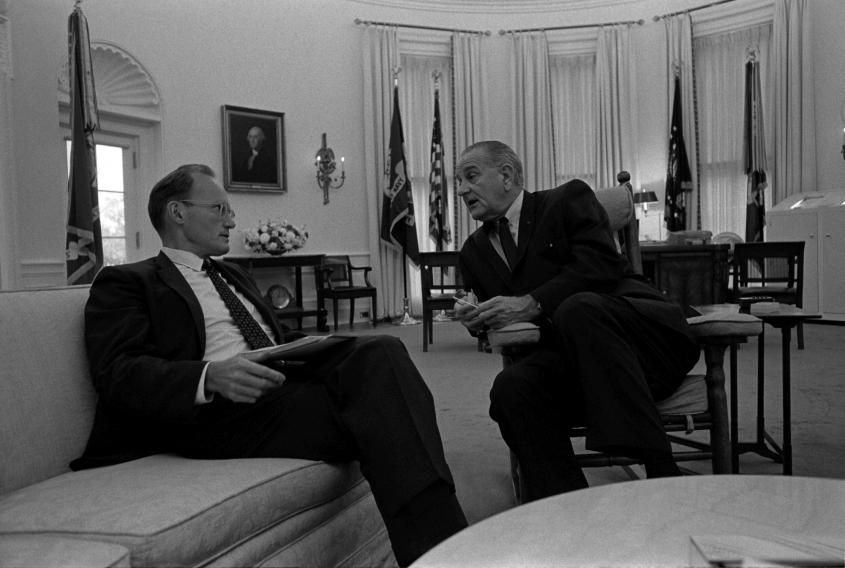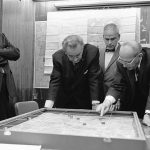Why did the United States choose to fight a major war in Vietnam? The question has bedeviled scholars almost since President Lyndon Johnson made the decision in 1965.
The most common answer that historians have offered over the years suggests that LBJ believed he had no real option but to commit U.S. forces. In this view, the president understood that the government of South Vietnam, a strong ally of the United States, would inevitably collapse under the weight of a mounting communist insurgency if Washington did not send troops to help stave off the threat. The president believed, moreover, that such a collapse would amount to a major defeat for the United States in a key part of the world and would imperil U.S. security everywhere by calling into question Washington’s determination to help its allies around the globe. So momentous were the stakes, in short, that LBJ never seriously considered any alternative to escalation. But LBJ was, in this view, certain of another thing too: U.S. troops, once committed, would inevitably succeed in defeating the communist insurgency and bolstering South Vietnam as a pro-U.S. bastion. Johnson was convinced of the necessity of intervening in Vietnam and the certainty of success.
As historians have gained access to secret documentation, however, they have questioned this interpretation. Again and again, newly opened records from the National Archives in Maryland, the Lyndon Johnson Presidential Library at UT-Austin, and elsewhere have demonstrated that the president and his advisers recognized reasonable alternatives to intervention and foresaw the many problems that would beset U.S. forces when they were sent into Vietnam. The result of such discoveries has been to paint a new picture of LBJ’s decision-making in 1964 and 1965. Where scholars once saw certainty and confidence, they now see indecision and anxiety.
One of the best pieces of evidence for this newer view of U.S. decision-making is the recording of a conversation between LBJ and his national security adviser, McGeorge Bundy, on May 27, 1964. This tape, released by the LBJ Library in 1997, is among the most spectacular of the telephone conversations recorded in the Oval Office during the Johnson presidency. Like other chief executives from Franklin Roosevelt to Richard Nixon, LBJ frequently recorded conversations and meetings, most likely in order to have a record to refresh his memory but possibly also to help shape the historical record. Whatever the motive, the recordings unquestionably offer historians a remarkable new resource for appreciating the president’s personal opinions much more fully than ever before.
In his conversation with Bundy, LBJ expresses deep anxiety about what would happen if the United States failed to defend South Vietnam from communist takeover – evidence that bolsters the older, conventional view of U.S. motives for escalation. Fearing what historians would later dub the “domino effect,” Johnson suggests that the communist powers – the Soviet Union and the People’s Republic of China – would be emboldened by a communist victory in South Vietnam and might make trouble elsewhere. The communists, in fact, “may just chase you right into your own kitchen,” the president says in his typical down-home manner. LBJ also provides evidence for the older interpretation by breezily dismissing other powerful Americans who urged him to negotiate a settlement and withdraw U.S. power from South Vietnam. He shows special contempt for Senate Majority Leader Mike Mansfield, charging that the Montana Democrat, a strong advocate of winding down the U.S. role in South Vietnam, had “no spine at all” and took a position that was “just milquetoast as it can be.”
In other parts of the conversation, however, LBJ heaps doubt on the idea that defending South Vietnam was crucial to U.S. security. “What in the hell is Vietnam worth to me?” he asks Bundy. “What is Laos worth to me? What is it worth to this country?” Most chillingly, Johnson shows keen awareness that victory in Vietnam was anything but a sure thing. He worries that full-fledged U.S. intervention in Vietnam would trigger corresponding escalation by communist China, raising the horrifying specter of a direct superpower confrontation, as in Korea a few years earlier, between Chinese and U.S. forces. “I don’t think we can fight them 10,000 miles away from home and ever get anywhere in that area,” LBJ asserts. Moreover, the United States, once committed to a war, might find it impossible to get out. “It’s damn easy to get into a war, but … it’s going to be awful hard to ever extricate yourself if you get in,” LBJ asserts with remarkable prescience.
Johnson also defies the older interpretation of his outlook by showing openness to a range of opinions about how to proceed in Vietnam. To be sure, he hardly expresses enthusiasm about the idea of cutting American losses and withdrawing from South Vietnam, as Mansfield and prominent journalist Walter Lippmann among others were urging at the time. Neither, however, does he dismiss the possibility out of hand when the subject comes up. On the contrary, he urges consideration of a wide range of opinions and expresses hope that Lippmann might sit down with the hawkish Secretary of Defense Robert McNamara to discuss their differences.
Which is the “real” LBJ – the president who dismissed Mansfield as spineless or the president who questioned the real value of an independent, pro-American South Vietnam to the United States? At the end of the day, of course, it’s impossible to say. Both sets of ideas seem to have swirled simultaneously in LBJ’s head as he made fateful decisions. But one thing is certain: simple, rigid interpretations of Johnson’s attitudes to not hold up to the remarkable complexity of the emerging documentary record. To appreciate U.S. decision-making fully will require the release of further sources but also, almost certainly, a willingness to tolerate contradictions, nuance, and ambiguity.
Listen to the conversation (Johnson, Lyndon B. Johnson’s Vietnam Anguish, May 27, 1964: Conversation with national security advisor McGeorge Bundy. 27 May 1964. History and Politics Out Loud. Ed. Jerry Goldman. 30 Sept. 1999. Northwestern University.)
Transcript of the conversation (Telephone Conversation Between President Johnson and the President’s Special Assistant for National Security Affairs (Bundy) Washington, May 27, 1964, 11:24 a.m.. Source: U.S., Department of State, Foreign Relations of the United States, 1964-68, Volume XXVII, Mainland Southeast Asia: Regional Affairs, Washington, DC, Document Number 53. Original Source: Johnson Library, Recordings and Transcripts, Recording of a telephone conversation between the President and McGeorge Bundy, Tape 64.28 PNO 111. No classification marking. This transcript was prepared by the Office of the Historian specifically for this volume.)




